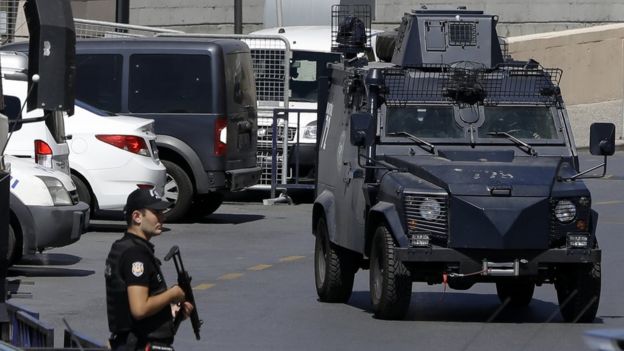Turkey coup inquiry: Police raid companies and target CEOs
BBC
Turkish police have raided 44 companies and are seeking the arrest of 120 company executives, as part of the investigation into last month’s failed coup, state media report.
The companies in Istanbul targeted by prosecutors are suspected of channelling funds to the movement of US-based cleric Fethullah Gulen.
The cleric is accused of organising the botched coup.
His followers are alleged to have set up a parallel state.
 Image copyright: AP
Image copyright: APImage caption: Police on Monday raided courthouses in Istanbul with warrants for the arrest of 173 justice officials
_
The co-ordinated raids, backed up by riot police, took place in the Uskudar and Umraniye districts of eastern Istanbul, Anadolu news agency said.
Some 240 people died resisting the coup on 15 and 16 July, as rebel parts of the military tried to seize control of Turkey, sending tanks into Ankara and Istanbul.
Since then Turks have witnessed a purge of the military and public services. An estimated 26,000 people have been detained and 82,000 dismissed or suspended. On Monday, police raided three Istanbul court houses searching for 173 judicial officials.
President Recep Tayyip Erdogan vowed earlier this month to root out businesses, schools and charities linked to Fethullah Gulen, which he labelled “nests of terrorism”. But, he said, it was in the business world that the roots of Gulenism were strongest.
“We will cut off all business links, all revenues of Gulen-linked business. We are not going to show anyone any mercy,” he said.
Turkey recovers from traumatic night – by Mark Lowen:

_
“It was a night of horror – but we weren’t scared for our lives, we were scared for our nation,” says Ravza Kavakci Kan, an MP with the governing AK Party, as we tour the destruction in parliament.
“But this was the day we would defend our democracy. It brought the Turkish people together in solidarity. It was our liberation war.”
- Pride and fear in Turkey – a month after the botched coup
- In Pictures: Battle on Bosphorus Bridge
- Turkish editor resigns after coup
Mr Gulen, 75, lives in self-imposed exile in the US state of Pennsylvania and denies involvement in the botched coup, however the Turkish authorities are seeking his extradition.
One factor that may dissuade the US authorities from extraditing him is that the Turkish parliament is expected to consider bringing back the death penalty. If they do, Mr Erdogan has said he will not stand in the MPs’ way.
Any purge of business in Turkey risks alienating foreign investors. Ratings agency S&P downgraded its credit rating for Turkey last month and Germany’s trade association warned against new investment in the country.
However, Turkish officials say they are optimistic that an improvement in relations with Russia will boost direct investment.
Turkish authorities have already targeted high-profile businesses as part of the coup investigation.
Three executives at Boydak Holding, one of Turkish largest conglomerates, were detained as part of the crackdown. The group has firms in energy and finance as well as furniture.
